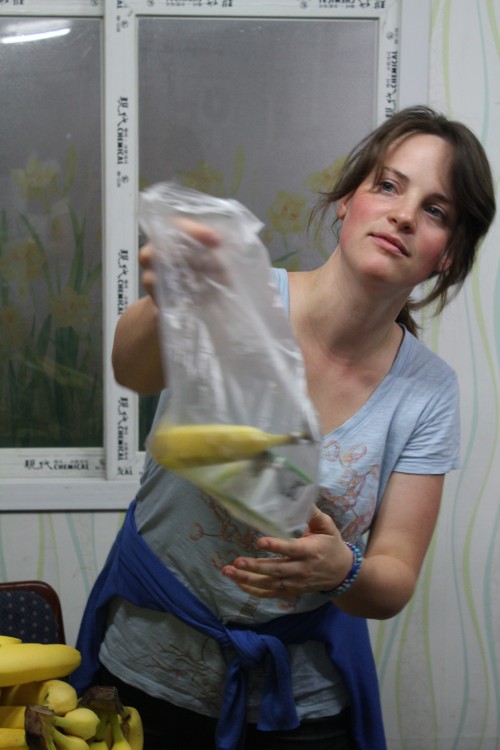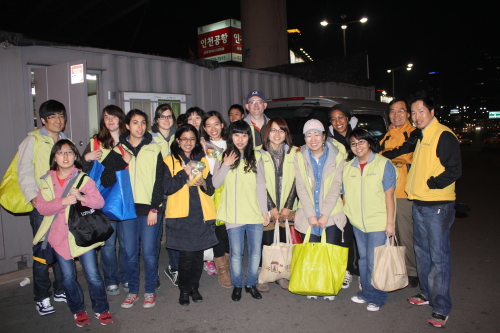It is dusk in a park near Seoul Station, and a small group has stopped beside a man curled motionless in the middle of the path.
A Korean charity worker approaches him, and gently nudges him. The man stirs and speaks. Everyone breathes a sigh of relief ― he was only sleeping.
One volunteer moves the plastic sandal that has fallen from his foot closer to him and another lays a bag of food down beside him before the group moves on through the park, with someone breaking away every few minutes to hand a clear plastic food bag to other men resting around the bushes.
This strange evening outing is the weekly activity of the PLUR volunteers. A group of up to 20 expats and Koreans meet every Sunday night at Seoul Station to donate cash, buy food and hand it out to the many homeless people sleeping rough around the area.
PLUR (Peace, Love, Unity and Respect) was launched in 2007 and now has almost 1,000 members of its Facebook group where all volunteer events are announced. Volunteer coordinators use the group to recruit people to help with a range of activities including orphanage visits and English camps at children’s centers.
The main regular activities are Friday night soup kitchens at the Resurrection Center near the Sookmyung Women’s University subway station as well as the Sunday food bag giveaway around Seoul Station.
Volunteer organizer Sarah Farkas, who organizes the Sunday event says: “PLUR was started here at Seoul Station. There are so many homeless people in this area it makes sense to come here.”
Once all volunteers have assembled at the station’s subway exit two at 7 p.m. Farkas collects a 10,000 won donation from each of them to buy supplies to make around 130 bags of food, containing bread, bananas, chocolate and soy milk.
Volunteers then set out to deliver them around Seoul streets.
“Almost all the homeless people we give food to are men,” Farkas says. “I have only seen two women in the whole time I have been doing this. I think the women tend to stay in shelters more as it can be dangerous for them staying on the streets.”
Most of the homeless people sleeping around the station sleep in underground passageways or in nearby parks ― but volunteers say these people are often moved away from the busy transport hub by police.
“During winter time two people who we regularly saw sleeping on the street disappeared. It was very cold at that time and we couldn’t see them anywhere,” says Chris Hong, who attends every second week with his 13-year-old daughter Ji-yoon.
“It is possible that they were evicted from the area or that something bad had happened to them. They never came back. That is one of the things that is difficult about volunteering like this.”
Another problem is the fluctuating number of volunteers.
“During the winter we sometimes had just ten volunteers and didn’t always have enough money to buy enough food,” says Hong, who works in IT and travels from Incheon to help out.
“Mostly, though, I don’t have any big challenges volunteering. It seems like a very idealistic action for me. The reason I decided to keep coming was because my daughter wanted to help. We have been doing this for eight months now. We talked together about homeless people and I told her that we have to live in this society with all other people. Whether she becomes really successful or well educated she has to live in this society all her life and to learn how to get on with these people.”
The group usually hands bags to around 80 homeless people before giving any leftover bags to other groups supporting homeless people in the area to hand out later.
One such volunteer is Keith Park, a graduate student at Yonsei Law School, who comes with friends every week to sing songs and raise awareness among passers-by about Seoul’s homeless people.
One favorite song was written by homeless man Yoo Chang-man, who died last December. The cancer victim had penned a poem two years ago about being homeless.
“I saw the poem and thought it would be good put to music,” says Park.
“Now my friends and I sing it every Sunday. I wanted him to hear us sing it and think that he had made something that was good for other homeless people, and find some meaning in what he made.”
PLUR’s Farkas is also organizing a shoe and clothing drive, and is urging people to stop by the charity hut located a short walk from Seoul Subway Station’s exit two any Sunday evening between 7 p.m. and 8 p.m.
She is looking for donations of shoes, clothes as well as other useful goods such as hand sanitizer and wet wipes.
“We are basically looking for anything that people don’t want that is useable. There is a very transient expat community in Seoul, so it would be great if people could bring useful things that they are not planning to take with them when they leave.”
Anyone interested in taking part in PLUR’s activities can learn more on the Facebook group “Volunteer for PLUR!”
By Kirsty Taylor (
kirstyt@heraldcorp.com)
I want to become a room
An autumn night like these days, at Seoul Station
waiting for the morning
in the waiting room, running away from the coldness
I want to become a room that will hide my shame
I want to become a room, I want to become a room
when the rain falls, when the wind blows
until the sun comes up.
A poem by homeless Seoul resident Yoo Chang-man, who died in December.









